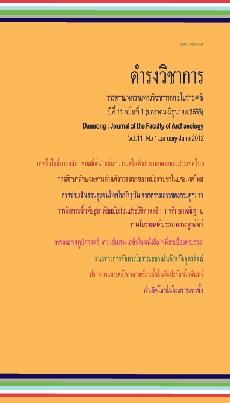THE RELATIONSHIP BETWEEN ‘ENGLISH LANGUAGE EXPERIENCE’ AND THAI STUDENTS VOWEL REDUCED ENGLISH WORD IDENTIFICATION ABILITY
Keywords:
การระบุคำ, การกร่อนเสียง, ภาษาอังกฤษAbstract
The objectives of this research are to: analyze and compare the ability in identifying English words with reduced vowel sounds using dictation tasks, and to analyze the relation between the English language experience and identification ability. The sample consisted of 3 groups of speakers: 1) 10 native speakers of English; 2) 30 Thai students with ‘high’ language competence; 3) 30 Thai students with ‘low’ English language competence. The test words in this study contained 3 reduced vowel sounds: . It was found that the native speaker group could identify 98.33% of the words correctly, 1.00% incorrectly, and were unable to identify 0.67%. The high competence group identified 62.56% of the words correctly, 31.11% incorrectly, and were unable to identify 6.33%. The low competence group had the lowest identification ability, identifying only 26.00% of the words correctly, 47.22% incorrectly, and were unable to identify 26.78%. Five major categories of errors were established: 1) Identifying the word correctly, but incorrectly spelling the word; 2) Identifying the word incorrectly as another word; 3) Identifying the word as another word and incorrectly spelling it; 4) Identifying a ‘non – word’ which is incorrect and meaningless; 5) Not identifying the word. The native speakers showed instances of the first and second categories. The high competence group demonstrated problems identifying words in the first four categories, but predominantly within category two. The low competence group also displayed errors identifying words in the first four categories as well as markedly higher instances in the fifth category. It can be deduced that vowel sound reduction of English words has a great effect on both listening skills and word identification.
References
Ball, M.J. and Rahilly, J. (1999). Phonetics: The Science of Speech.1st ed. London: Arnold Publishers.
Corder, S.P. (1981). Error Analysis and Interlanguage. 1st ed. Oxford: Oxford University Press.
Dauer, R.M. (1993). Accurate English: A Complete Course in Pronunciation. 1st ed. Englewood Cliffs, N.J.: Prentice Hall.
Gass, S.M. and Selinker, L. (1992). Language Transfer in LanguageLearning. rev ed. Amsterdam: John Benjamins.
James, C. (1980). Contrastive Analysis. 1st ed. London: Longman.
Lado, R. (1968). Linguistics across Cultures: Applied Linguisticsfor Language Teachers. 1st ed. Ann Arbor: The University of Michigan Press.
Luksaneeyanawin, S. (1998). Intonation in Thai. In Daniel Hirst and Albert Di Cristo (Ed.). Cambridge University Press.
Luksaneeyanawin, S. (2007). Unfolding Linguistics. In Wirote Aroonmanakun (Ed.). Bangkok: Chulalongkorn University.
Postman, L. (1971). Transfer, interference and forgetting. Woodworth’sand Schlosberg’s Experimental Psychology. 3d ed. by J.W. Kling and L.A. Riggs. New York: Holt, Rinehart, and Winston.
Selinker, L. (1992). Rediscovering Interlanguage. 1st ed. London: Longman.
Sudasna Na Ayudhaya, P. (2007). The Ways of the Mental Lexicon.In Wirote Aroonmanakun (Ed.). Bangkok: Chulalongkorn University.
นิตยา วัยโรจนวงศ์. (2527). การศึกษาเปรียบต่างของระบบเสียงหนักเบาในภาษาอังกฤษและภาษาไทยและการวิเคราะห์ข้อผิดในการออกเสียงศัพท์แพทย์หลายพยางค์ในภาษาอังกฤษ.วิทยานิพนธ์ปริญญาอักษรศาสตรมหาบัณฑิต ภาควิชาภาษาศาสตร์จุฬาลงกรณ์มหาวิทยาลัย.
พนอเนื่อง สุทัศน์ ณ อยุธยา. (2545). แบบจําลองระบบคลังคําในผู้พูดทวิภาษาที่มีประสบการณ์ทางภาษาที่สองสูงและต่ำ: การศึกษาการนึกรู้คําเชิงทดลอง. วิทยานิพนธ์ปริญญาอักษรศาสตรดุษฎีบัณฑิต ภาควิชาภาษาศาสตร์ จุฬาลงกรณ์มหาวิทยาลัย.
Downloads
Issue
Section
License
บทความนี้เป็นผลงานของข้าพเจ้าแต่เพียงผู้เดียว และ/หรือเป็นผลงานของข้าพเจ้าและผู้ร่วมงาน ตามชื่อที่ระบุในบทความจริง และเป็นผลงานที่มิได้ถูกนำเสนอหรือตีพิมพ์ที่ใดมาก่อน





